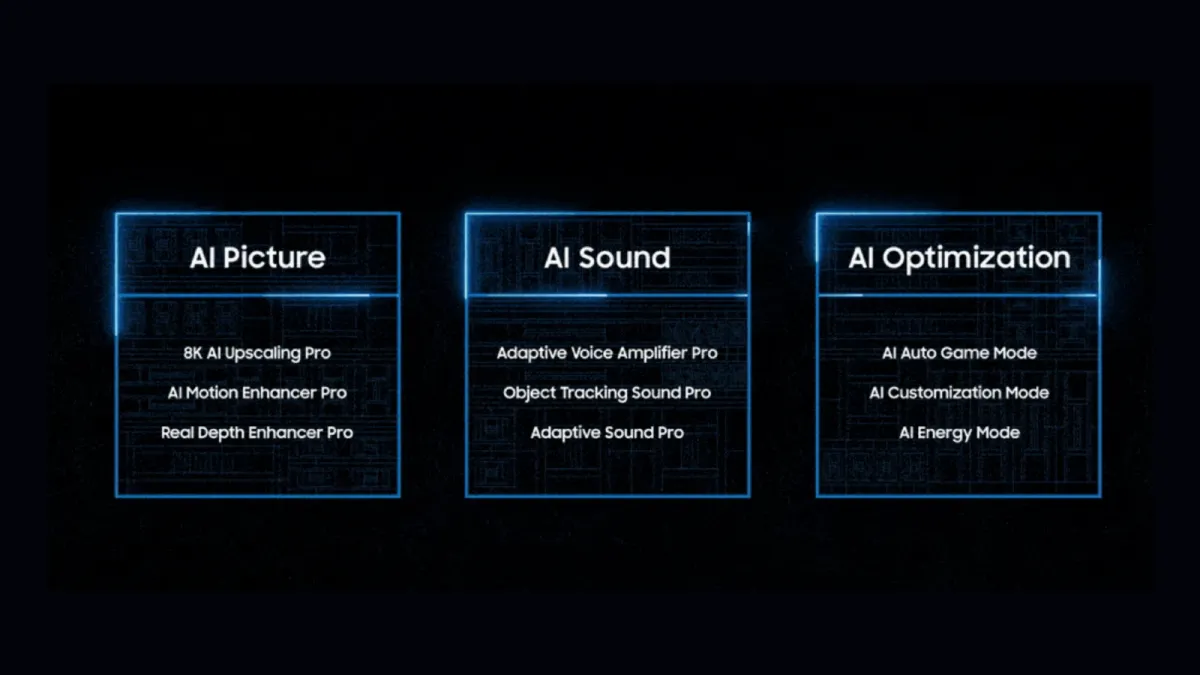Samsung Electronics this month announced the launch of its next-generation Neo QLED TVs equipped with the company's most powerful processor to date, the 8K NQ8 AI Gen3. This new processor leverages artificial intelligence (AI) and machine learning to personalize the viewing experience for users.
AI technology is increasingly being integrated into consumer electronics, including televisions. In the context of TVs, AI can be used for various purposes, such as:
Picture and Sound Optimization: AI can analyze content being viewed and automatically adjust picture settings (brightness, contrast, color) and sound profiles to optimize the viewing experience for different types of content, such as movies, sports, or gaming.
Content Recommendation: AI can analyze user viewing habits and preferences to recommend personalized content suggestions, similar to recommendation algorithms used by streaming services.
Voice Control Enhancement: AI can improve the accuracy and natural language processing capabilities of voice assistants built into smart TVs.
Samsung's AI-Powered TV Features
Samsung's new Neo QLED TVs with the 8K NQ8 AI Gen3 processor boast several AI-powered features designed to enhance the user experience:
AI Upscaling: This feature utilizes AI to upscale lower-resolution content to near-8K quality, potentially improving the viewing experience for content not originally filmed in 8K resolution. According to Samsung, this is particularly beneficial for live sports broadcasts.
AI Motion Enhancer Pro (Limited Availability): This feature, available only on select models, leverages AI to analyze motion in fast-paced content and optimize frame rates to reduce blur and judder, potentially improving the viewing experience for sports and action movies.
Adaptive Sound Pro: This feature uses AI to analyze the acoustics of the viewing environment and the type of content being played to automatically adjust sound settings for optimal audio quality.
Benefits and considerations
The integration of AI into televisions offers several potential benefits for users, including:
- Personalized Viewing Experience: AI-powered features can tailor picture, sound, and content recommendations to individual user preferences.
- Enhanced Content Quality: AI upscaling can improve the viewing experience for non-native 8K content.
- Simplified User Interface: Voice control enhancements powered by AI can make it easier for users to interact with their TVs.
However, there are also some considerations to keep in mind:
- Privacy Concerns: Some users may have concerns about the potential for AI-powered TVs to collect and analyze user data. It's important for manufacturers to be transparent about data collection practices and provide users with control over their data.
- Limited Control: While AI can offer personalization, some users may prefer to have more manual control over picture and sound settings.
- Potential for Bias: As with any AI system, there's a potential for bias within algorithms used for content recommendation or other AI-powered features.
Impact on the television industry
The introduction of AI-powered TVs by Samsung represents a significant step towards a more personalized and intelligent television viewing experience. This trend is likely to be followed by other TV manufacturers, potentially leading to a more competitive landscape focused on innovative AI features.
Marketers working in the consumer electronics industry should stay informed about the evolving role of AI in televisions. Understanding the potential benefits and limitations of AI-powered features can help marketers develop effective strategies for promoting these new technologies to consumers.
Share this article
The link has been copied!


